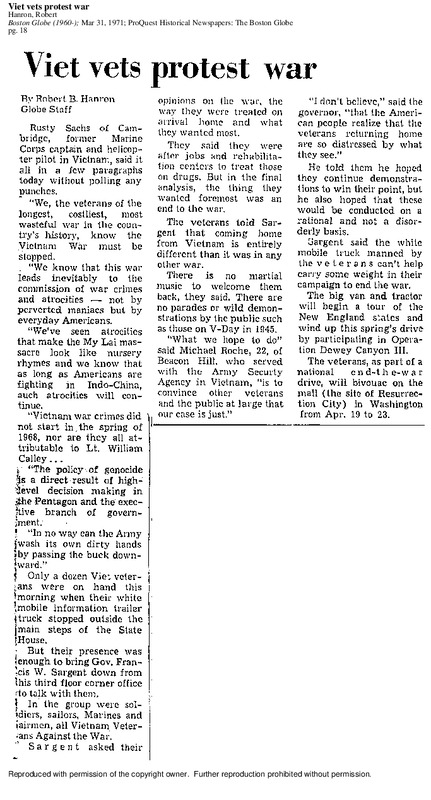Vietnam Veterans Against the War
As Rusty's time in Vietnam progressed, he became increasingly frustrated with the loss of life he witnessed and the challenges of justifying the conflict. He struggled to understand the rationale presented by his peers and politicians, describing it as the 'religion of anti-communism' or a pervasive fear of communism that many used to justify the war. It was during his time in Vietnam that Rusty came to the realization that the Vietnamese people's fight was driven by a deep sense of nationalism and the desire to repel invaders, rather than solely being motivated by a love for communism.
After returning to Cambridge, Rusty began expressing his thoughts and concerns about the war by writing letters to the editors of local newspapers and magazines. His letters caught the attention of John Kerry, another Vietnam Veteran, who reached out to Rusty and invited him to be involved in the efforts of Vietnam Veterans Against the War. Rusty became actively engaged by speaking and helping to organize the group and protests alongside this community of veterans.
"I was frustrated, and dissapointed, and opposed to the continuation of this war. There wasn't any reason for getting people killed. And there sure has hell wasn't any reason for killing people."
- Ernest Paul "Rusty" Sachs
Vietnam Veterans Against the War consisted of members from various branches of the military, united by their shared opposition to the war. While not a strictly organized group, they collectively recognized the urgent need for transformation. Within their ranks, diverse perspectives and approaches emerged, reflecting their unique experiences. Some emphasized the moral standpoint of opposing harm to the Vietnamese people, while others highlighted the devastating loss of American lives, exposing the toll on families and communities back home. They believed that the true reality of the war was distorted by the mainstream media and political establishment, leading to a misrepresentation of the situation to the American public.
Vietnam Veterans Against the War sought to challenge the prevailing narrative and engage in open conversations about the complexities of the conflict. By sharing their stories and shedding light on their experiences, they aimed to bridge the gap between public perception and the harsh realities they had witnessed. They hoped to contribute to a national dialogue that would reassess and reevaluate the United States' involvement in Vietnam.
"In grade school we learned about red coats, the nasty British soldiers that tried to stifle our freedom and the tyranny of George III and ah and I think again subconsciously, but not very subconsciously. I...I began increasingly to have the feeling that I was a red coat. Ah. And, I think it was one of the most staggering realizations of my life that that suddenly to understand that I wasn’t hero, I wasn’t a good guy, I wasn’t handing out candy and cigarettes to the kids in the French villages, ah, that somehow I had become everything I had learned to believe was evil."
- William Daniel Ehrhart



